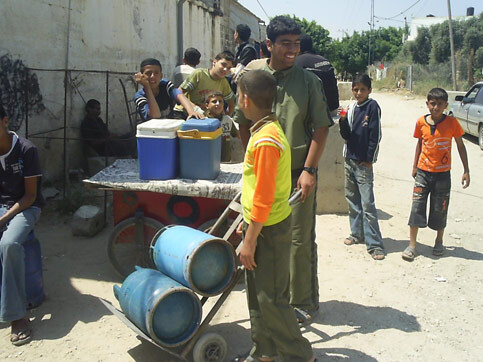Gaza Strip 12 May 2008

Palestinians in Gaza wait to receive cooking gas. (Rami Almeghari)
As the Israeli siege on the Gaza Strip enters its 11th month, the population’s living conditions further deteriorate, with scores of people in different parts of the coastal region lining up in front of gas stations to receive provisions of cooking gas, a scarce commodity over the past four weeks.
In eastern Gaza City at Abu Jebba station, one of the largest suppliers of cooking gas, 21-year-old Gaza resident Anwar Harazeen waited from 3:00 am until 11:00 am last Friday for his share of cooking gas while his 12-member family waited at home.
“We have been living without cooking gas for more than a week now; we cook and heat tea and milk on wood-burning stoves. The situation is really miserable. I swear I have been waiting for my share of gas since three o’clock in the morning, while others have been here since 10 o’clock last night. What shall we do? We need a solution,” said Harazeen wearily.
Along with Harazeen were many adults and children sitting with their empty gas canisters with the hope they would return home with some gas for their needy families.
“I stayed one week, moving from one gas station to another, in the hope I would get some gas for my family. Today I was here since 1:30 am, waiting in this line as you see. The situation is miserable, I blame the government of Hamas for not ensuring me a good living. We have elected this government to ensure us at least the basic things for living,” said Ayman, a 32-year-old father of six children.
Ayman tries to get his two babies’ milk prepared by knocking his neighbors’ doors, who also don’t have enough gas.
“The situation, my brother, is so miserable. In the past days, my two wives had to cook using wood-burning stoves. The lack of gas is also making me a great deal of headache inside the home. I appeal to all those who resist to avoid hitting the fuel trucks,” Ayman said, referring to a recent attack on the Nahal Oz commercial crossing that was recently attacked by Palestinian fighters.
Just a few meters away from the Abu Jebba gas station, the Gaza Strip Poultry Company sits idle after owners of the company were forced to slaughter tens of thousands of chicks that would otherwise have died from the cold as there was no gas to heat their cages.
“From a humanitarian perspective, I cannot accept slaughtering the chicks, to the extent that I didn’t sleep yesterday for observing the slaughter of the chicks. I was forced to do that; where will I put them now? Scatter them in streets? If I do so, diseases will be spread. If I am forced soon to slaughter more chicks, we are now talking about three million chicks, which would mean a deficit of 100 percent or at least 90 percent for the local market,” explains owner Toufic Bakro.
It appears that more thousands of chicks will be slaughtered in the upcoming days, as the shortage of cooking gas continues in the impoverished Gaza Strip, as Israel still doesn’t allow the importing of adequate amounts of gas into the coastal territory.
Since June of last year, following the democratically-elected Hamas’ routing of Fatah forces, Israel imposed a crippling closure on the Gaza Strip and in October began to cut off essential supplies like fuel and food items. In January of this year, it further tightened its measures. Israel says that its actions are meant to stop the firing of homemade rockets onto nearby Israeli towns.
Israel recently blamed Hamas for the fuel and cooking gas crisis, saying that the party manufactured the crisis by refusing fuel and gas shipments that Israel sends through the Nahal Oz fuel terminal in eastern Gaza. Israel closed the terminal almost four weeks ago, in the wake of a cross-border attack that claimed the lives of two Israelis.
But Mahmoud al-Khozendar, the deputy-director of Gaza’s Petrol Station Owners Association, refuted the Israeli claims, saying that no effort was spared to alleviate the humanitarian burden caused by the siege.
“This is a big lie, because in the terminal of Nahal Oz, there is a space for 900 tons of liquid petrol gas, but they send nothing. Our stations do not stop them from bringing gas, but they send nothing. Also, we have already withdrawn all fuel from Nahal Oz, and the Israeli people know that there is nothing in Nahal Oz and they can send [fuel], but up until now they haven’t sent a liter of gasoline, diesel or cooking gas.”
Gaza’s 1.5 million residents need at least 300 to 350 tons of cooking gas on a daily basis, yet according to al-Khozendar, Israel is important less than half the necessary fuel.
The shortage of gas has further restricted the movement of Palestinians in Gaza throughout the region, causing motorists to improvise their means of fuel and paralyzing the transportation sector.
Late January of this year Israeli Prime Minister stated that “We will not let the residents of Gaza lead a comfortable and pleasant life” so long as rockets are fired from the Strip, adding, “As far as I am concerned, all of Gaza’s residents can walk,” referring the collective punishment measures imposed by Israel on the people of Gaza.
Such is Israel’s cynical treatment of Gaza, where 80 percent of the population depend on humanitarian food aid and anemia amongst children is pervasive and the health care system is on the verge of collapse.
Rami Almeghari is currently contributor to several media outlets including the Palestine Chronicle, IMEMC, The Electronic Intifada and Free Speech Radio News. Rami is also a former senior English translator at and editor in chief of the international press center of the Gaza-based Palestinian Information Service. He can be contacted at rami_almeghari at hotmail.com.
Related Links





